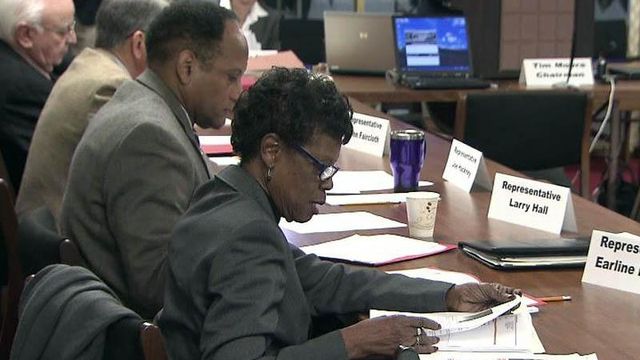Death penalty, race divide NC House panel members
Sharp partisan differences surfaced once again as lawmakers considering changes to North Carolina's Racial Justice Act held their first meeting Friday.
Posted — UpdatedThe House Select Committee on Racial Discrimination in Capital Cases met one month after Republicans fell a few votes short of overriding Democratic Gov. Beverly Perdue's veto of a bill that would have essentially repealed the 2009 law. House leaders sent the bill to the new committee to see if changes could be worked out to avoid another veto or sway enough Democrats to secure an override.
Rep. Tim Moore, who chairs the panel, said he'll seek a consensus to address concerns by prosecutors and others about how the law is applied. The law creates a new legal process by which a judge must reduce a death sentence to life in prison without parole if the judge determines race was a significant factor in the sentencing. Defendants can use statistics to make their case – a big hang-up for the law's opponents.
"Since the majority of both chambers passed this bill and it was kept from going into law by the executive branch, the thought is to ... give it another try and to hear from the folks who are actually having to deal with the application of this law," said Moore, R-Cleveland. The committee aims to have recommendations by May, when the next extended General Assembly work session is scheduled.
Democrats on the committee questioned why the law should be altered when the first such case involving a death-row inmate is just beginning to make its way through the courts. The first evidentiary hearing under the law continued Friday in Fayetteville involving convicted killer Marcus Robinson.
House Minority Leader Joe Hackney told Moore the Racial Justice Act shouldn't be interfered with until at least after Robinson's case is resolved, if it all, because there are no known unintended consequences. A death penalty litigation lawyer estimated it would take a year for Robinson's case to be completed, given likely appeals.
"We have an active application of the act in court as we speak," said Hackney, D-Orange.
But Rep. Sarah Stevens, R-Surry, said there were already unintended consequences. Nearly all of the 158 prisoners currently on death row have filed papers seeking relief under the Racial Justice Act, including white defendants convicted of murdering white victims. Racial Justice Act supporters say white defendants can also face discrimination if prosecutors deliberately remove black citizens from jury pools as a strategy to seat a jury that will sentence someone to death.
The state's district attorneys – nearly all of whom sought the override of Perdue's veto – have said the requests by so many defendants show how overly broad the 2009 law is and how it will extend a de facto death penalty moratorium that has gone on for 5½ years largely for other reasons.
Wake County District Attorney Colon Willoughby told the committee the use of statistics to attempt to prove racial bias is too expansive, and he called the law "a Trojan horse for the moratorium."
"When you look at the racial make-up of the defendants and victims, it's completely skewed," Willoughby said. "It has no bearing on any kind of rational assumption as to any type of racial discrimination."
The 2009 law also is vague on how judges should conduct a hearing, giving them room to "impose their own political philosophy" and deny certain evidence from being heard, he said.
Ken Rose, a senior attorney for the Center for Death Penalty Litigation in Durham, disagreed, saying "the courts are in the best position to sort out this evidence, to interpret this law and to apply the law," pointing out that trial judges already preside over murder trials that may end with a death sentence.
"If we can't trust them to interpret and apply this Racial Justice Act, why would we trust these same judges in deciding important issues of who lives or dies under our capital punishment law?" Rose asked the committee.
"There's concern about huge disparities in the exclusion of qualified African-American citizens from juries," he said. "We can look honestly at race, and we can change things if we find that race is a significant factor in these case."
Darryl Hunt, who spent nearly 20 years in prison for a rape and homicide he didn't commit before DNA evidence exonerated him, said justice isn't always blind in North Carolina.
"It's just sad that our own district attorneys continue to use race as a factor," said Hunt, who is black.
Committee members heard from other supporters and opponents of the Racial Justice Act, including district attorneys and relatives of murder victims. The speakers have given similar presentations to legislators in recent months as the Racial Justice Act repeal was heard.
Moore said the committee would look at several ideas, including whether to narrow the scope of the use of statistics in these evidentiary hearings.
"We'll see if we can reach some compromise, and if we don't, something will get done or not get done depending on the votes," he said.
The Racial Justice Act also applies to murder defendants who have not yet gone to trial and are challenging a prosecutor's decision to seek the death penalty. Committee members also wanted more information on a Michigan State University study that showed a defendant in North Carolina is 2.6 times more likely to be sentenced to death if at least one of the victims is white.
• Credits
Copyright 2024 by WRAL.com and the Associated Press. All rights reserved. This material may not be published, broadcast, rewritten or redistributed.






